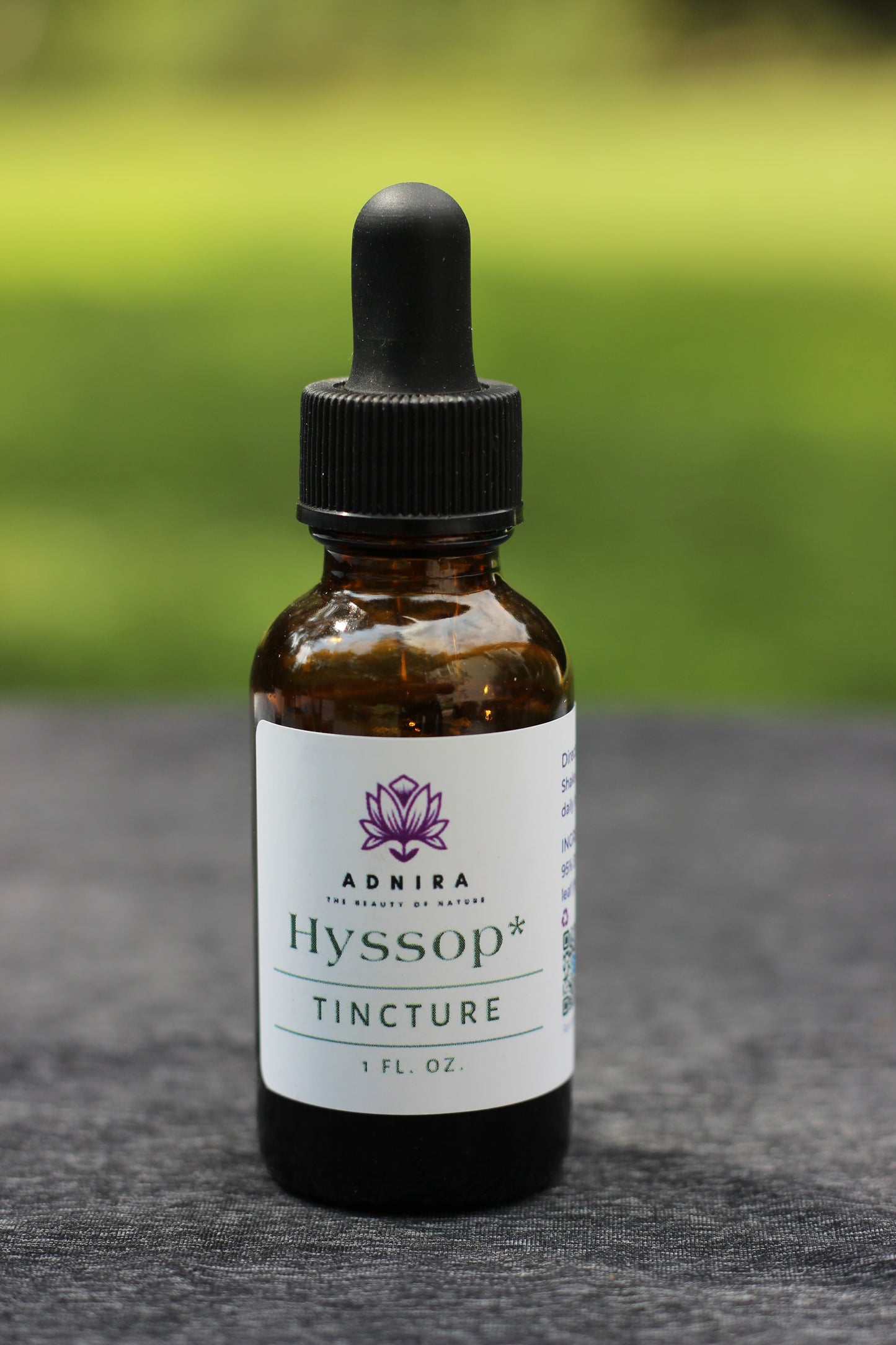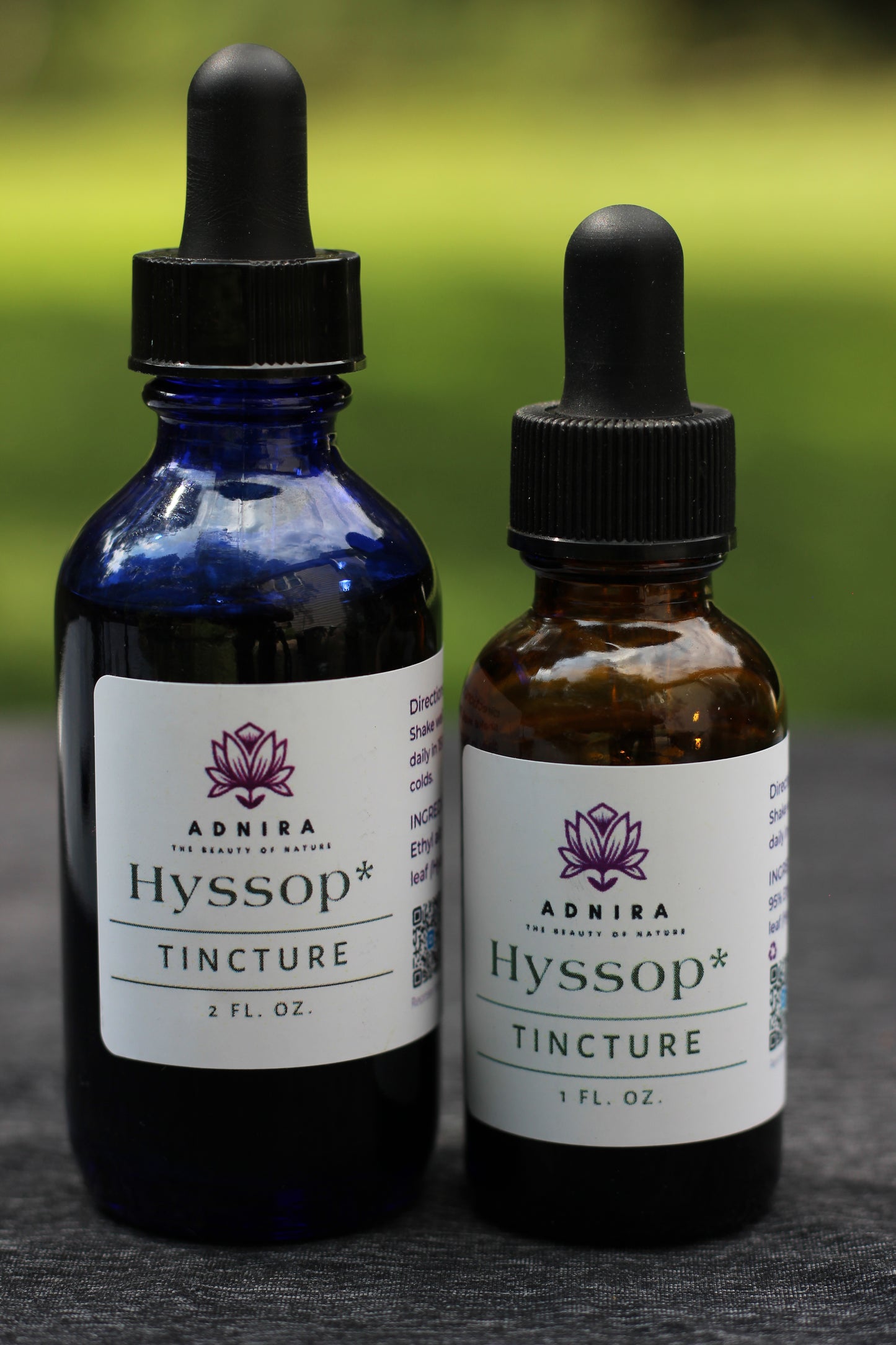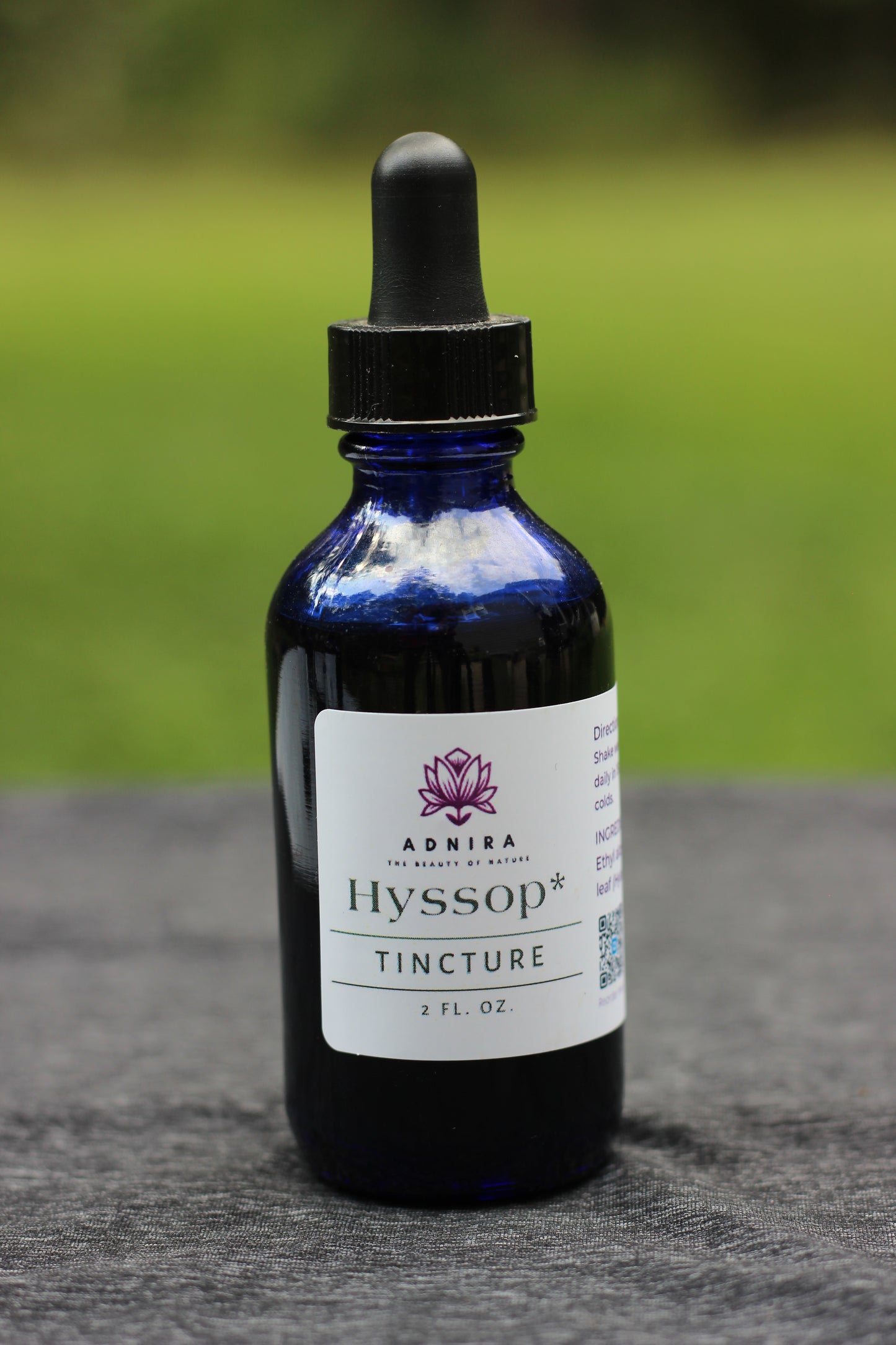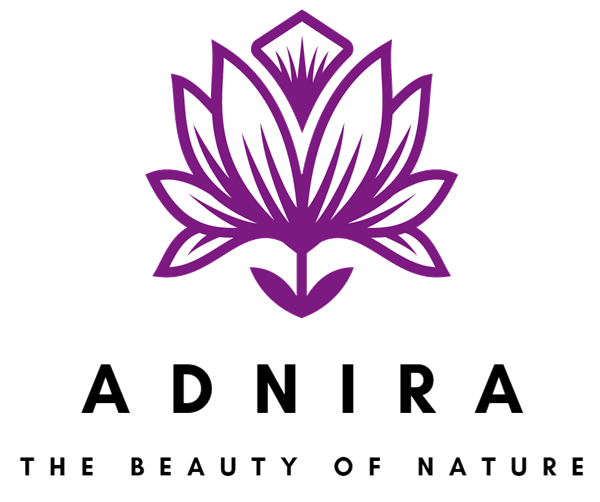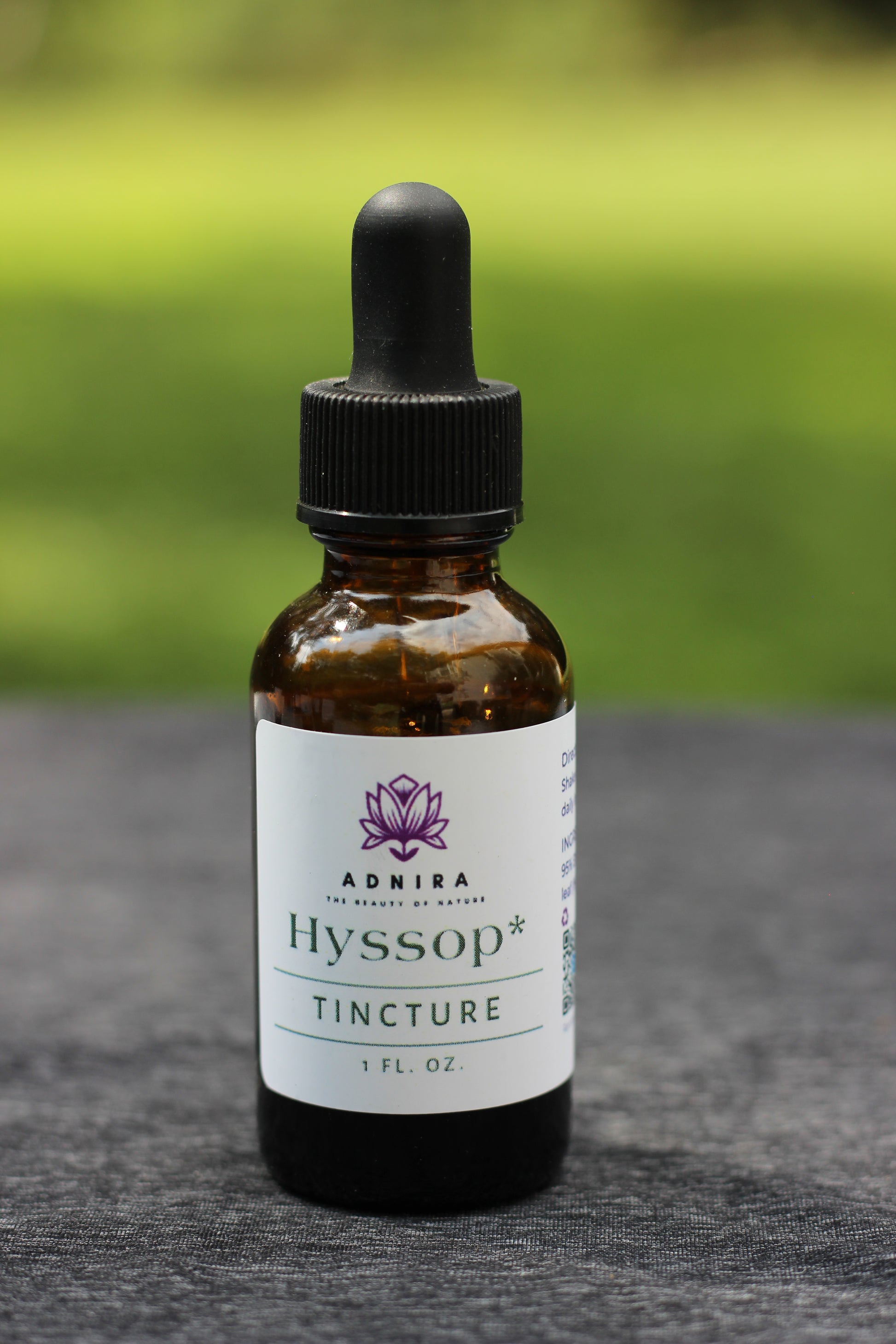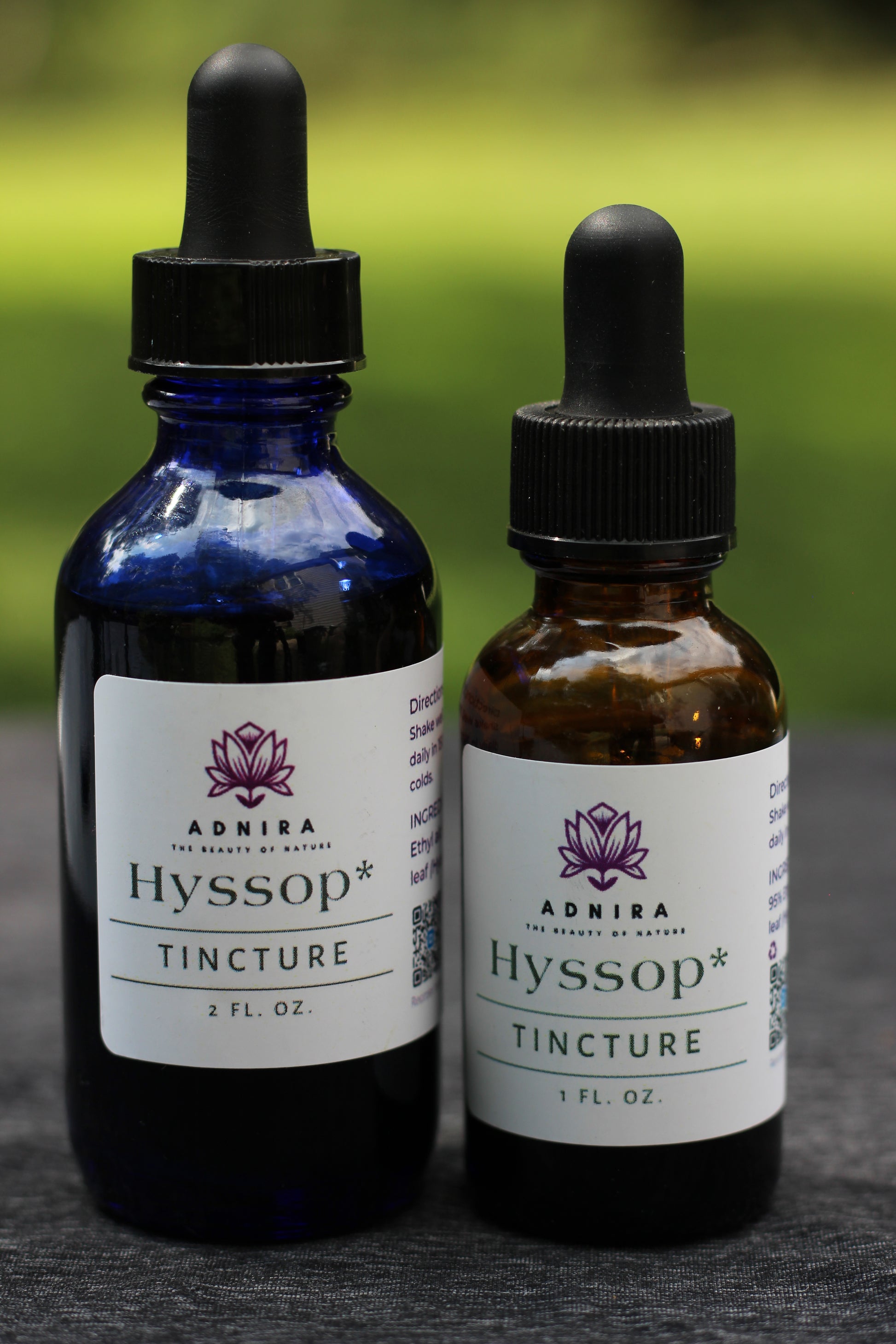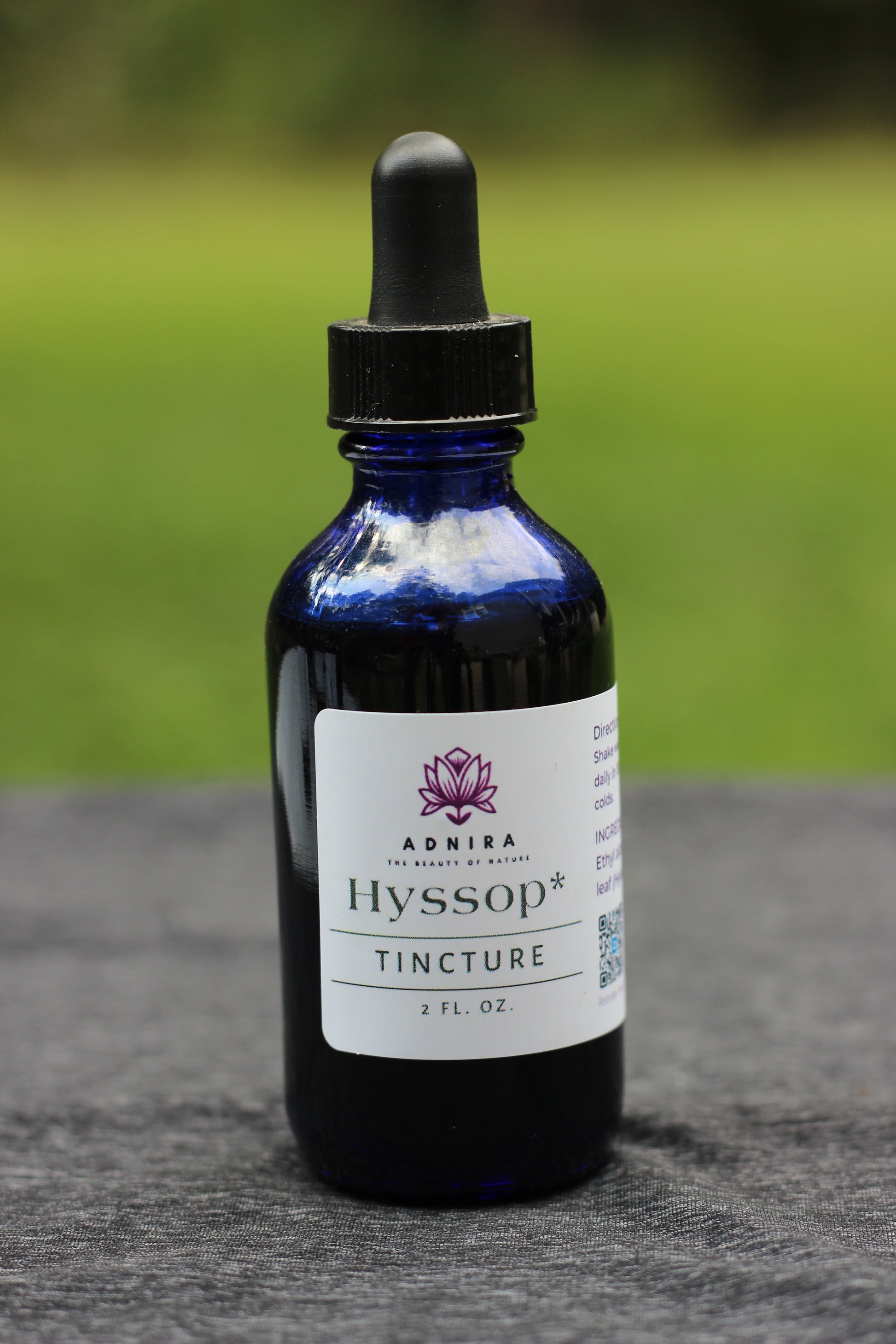Adnira
Hyssop Alcohol-Based Tincture
Hyssop Alcohol-Based Tincture
Couldn't load pickup availability
Hyssop (Hyssopus officinalis)
A versatile herb known for its aromatic, medicinal, and culinary uses. It has been traditionally used to support respiratory health, digestion, and general well-being. Here's a detailed breakdown of its phytochemical and nutrient content:
Phytochemicals:
-
Volatile Oils:
- Pinocamphone, Isopinocamphone, Camphor: These are the primary components of hyssop's essential oil. They have expectorant, antimicrobial, and anti-inflammatory properties, which make hyssop useful for treating respiratory issues like coughs, colds, and bronchitis.
- Limonene, Terpinene, β-Pinene: These compounds add to hyssop's aromatic profile and contribute to its antioxidant, anti-inflammatory, and antimicrobial effects. Limonene, in particular, is known for its uplifting and calming properties.
-
Flavonoids:
- Apigenin, Luteolin, Quercetin: These antioxidants help to protect cells from oxidative stress, reduce inflammation, and support the immune system. They also contribute to the overall anti-inflammatory effects of hyssop.
-
Phenolic Acids:
- Caffeic Acid, Rosmarinic Acid: These are powerful antioxidants that provide anti-inflammatory, antiviral, and antimicrobial benefits. Rosmarinic acid, found in many aromatic herbs, helps soothe inflammation and supports respiratory health.
-
Tannins:
- These compounds have astringent properties, which help tighten tissues and support skin and digestive health. Tannins also contribute to the antimicrobial and anti-inflammatory effects of hyssop.
Nutrients:
-
Vitamins:
- Vitamin C: An antioxidant that boosts the immune system, promotes skin health, and aids in the absorption of iron.
- Vitamin A (Beta-Carotene): Supports vision, skin health, and immune function. It also has antioxidant properties that protect cells from oxidative damage.
-
Minerals:
- Calcium: Important for bone health, muscle function, and nerve signaling.
- Magnesium: Supports muscle relaxation, nerve function, and energy production.
- Potassium: Helps regulate fluid balance, nerve signals, and muscle contractions.
- Iron: Essential for oxygen transport and energy production.
Actions and Uses:
Hyssop is valued for its antioxidant, anti-inflammatory, antimicrobial, and expectorant properties. Here are some common uses:
- Respiratory Health: Hyssop is traditionally used to relieve respiratory conditions such as colds, coughs, bronchitis, and asthma. Its expectorant properties help to clear mucus from the respiratory tract, while its anti-inflammatory effects soothe irritated tissues.
- Digestive Health: The herb can be used to promote digestion, relieve bloating, and address mild gastrointestinal issues. Its carminative (gas-relieving) and antispasmodic properties make it useful for reducing stomach cramps and discomfort.
- Immune Support: The antioxidants and antimicrobial compounds in hyssop help to strengthen the immune system, making it beneficial during times of illness or seasonal changes.
- Skin Health: Hyssop can be applied topically (when properly diluted) to treat minor skin irritations, cuts, and bruises. Its astringent properties help tighten tissues and promote healing.
- Mental and Emotional Wellness: Hyssop has mild nervine effects, meaning it can help relax the nervous system. It is sometimes used to relieve anxiety, stress, and restlessness.
Hyssop (Hyssopus officinalis) is generally considered safe for most people when used in moderation, but there are important precautions to be aware of, particularly concerning its essential oil. Here’s a summary of safety considerations:
1. Internal Use (Teas, Tinctures, Capsules)
- Moderation is Key: When used in teas, tinctures, or capsules, hyssop is usually safe for most adults. It's important to follow recommended dosages on product labels or as advised by a healthcare professional. Generally, consuming 1-2 cups of hyssop tea daily or taking a standard dosage of a tincture (15-30 drops) is considered safe.
- Avoid Excessive Use: Large amounts of hyssop, especially in concentrated forms like tinctures or capsules, can lead to digestive upset, nervous system effects, or, in rare cases, convulsions. It’s best not to use high doses without professional guidance.
- Children: Hyssop should not be given internally to young children, especially under the age of 5, as it can be overstimulating for their nervous systems and may cause convulsions in higher doses.
2. Topical Use
- Dilution is Essential: Hyssop essential oil can be applied to the skin for conditions like bruises, cuts, or skin irritation, but it must always be diluted with a carrier oil (such as coconut, almond, or jojoba oil) before use. A safe dilution ratio is generally 1-2% essential oil to carrier oil.
- Patch Test: Before using hyssop essential oil on a larger area of the skin, do a patch test on a small area to check for any adverse reactions like redness, itching, or irritation.
3. Drug Interactions and Health Conditions
- Epilepsy and Seizure Disorders: As mentioned, due to its neurostimulant properties, hyssop should be avoided by individuals with a history of seizures or epilepsy.
- Interactions with Medications: Hyssop may interact with certain medications, especially those that affect the nervous system. If you are taking any medication, consult a healthcare provider before using hyssop extracts or essential oils.
General Guidelines for Safe Use:
- Use in Moderation: Stick to moderate, recommended doses, and avoid prolonged use without taking breaks. For teas and tinctures, consistent use over 2-3 weeks followed by a short break (1 week) is often suggested.
- Consult a Healthcare Provider: If you are pregnant, nursing, have a health condition (especially related to the nervous system), or are taking other medications, speak to a healthcare provider before using hyssop.
- Choose Quality Products: Opt for high-quality, organic products to ensure safety and efficacy. Contaminated or poor-quality herbs and oils can increase the risk of adverse effects.
In summary, hyssop is generally safe for most adults when used appropriately in tea, tincture, or capsule forms. Always avoid internal use of the oil without guidance, and be mindful of contraindications. If used carefully and mindfully, hyssop can be a beneficial herb for respiratory, digestive, and general wellness.
Share
